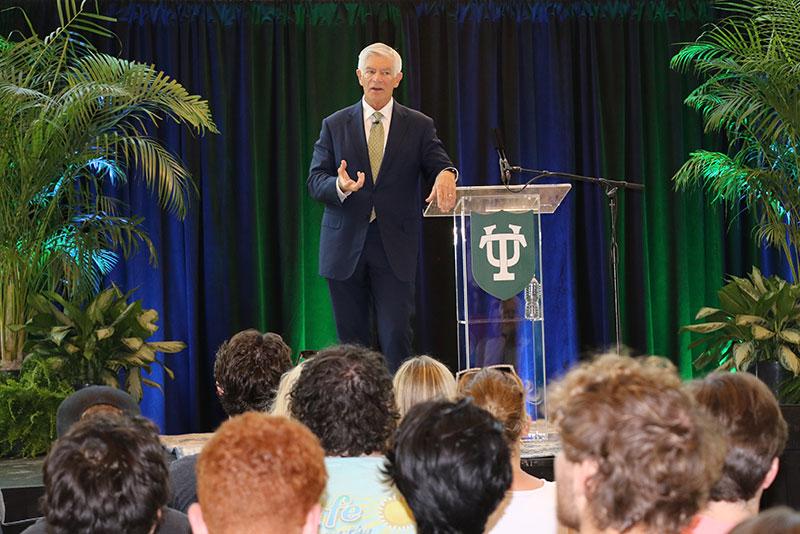Philadelphia Fed President highlights opportunities at Federal Reserve

On Sept. 18, the Federal Open Market Committee lowered interest rates by half a percentage point, the Fed’s first reduction in over four years. The announcement generated international headlines, but in an appearance at Tulane University’s Freeman School of Business two days later, committee member Patrick Harker sought to put that rate cut in context.
“It’s not just about the decision that day, it’s about the path of decisions,” said Harker, president of the Federal Reserve Bank of Philadelphia. “It really is a process as opposed to a point solution … because in modern monetary theory, it’s expectations of interest rates that matter, not the interest rate necessarily itself.”
Harker entitled his talk “The Federal Reserve: It's More Than Just Interest Rates,” and he used the opportunity to dispel the notion that the central bank is focused solely on monetary policy. An engineer by training, Harker stressed that the Fed seeks out individuals from a wide range of educational backgrounds.
“You do not need to be a PhD economist to make it at the Fed,” said Harker, who became president of the Philadelphia Fed in 2015. “You just need to be driven by a desire to make our economy healthier, stronger and more inclusive.”
Before assuming his current role, Harker served as the 26th president of the University of Delaware. He was also a professor of business administration in the university’s Alfred Lerner College of Business and Economics and a professor of civil and environmental engineering in the College of Engineering.
Before joining the University of Delaware in 2007, Harker was dean and Reliance Professor of Management and Private Enterprise at the Wharton School of the University of Pennsylvania. Prior to being appointed dean in 2000, Harker was the Wharton School’s interim dean and deputy dean as well as the chair of its Operations and Information Management Department. In 1991, he was the youngest faculty member in Wharton’s history to be awarded an endowed professorship as UPS Transportation Professor of the Private Sector. He has published/edited nine books and more than 100 professional articles. From 1996 to 1999, he served as editor-in-chief of the journal Operations Research.
Over the course of his talk to a standing-room-only audience in the Freeman School's Marshall Family Commons, Harker outlined the structure of the Federal Reserve System, which consists of the Board of Governors in Washington, D.C., and 12 regional banks, and explained that while these entities often work in partnership, each district bank conducts its own research and oversees operations in its region.
Harker detailed the Fed’s dual mandate of ensuring stable prices and maximum employment. He compared managing the economy to driving a bus, with the Federal Open Market Committee using policy rates to control the speed.
“If we sense the bus is going too slow, the FOMC can give the economy a little more gas by setting policy rates low to stimulate consumption and investment,” he explained.
Beyond monetary policy, Harker highlighted various research initiatives at the Philadelphia Fed. These include the Worker Voices project, which explores job choices of low-wage workers, and the Occupational Mobility Explorer, an online tool that can help workers find potential career paths to higher-paying jobs.
He also discussed the bank’s work on transportation issues, consumer behavior through the Consumer Finance Institute and historical data analysis via the Center for Restoration of Economic Data (CREED).
Harker emphasized the importance of community development outreach, noting that the Fed relies on both hard data and soft data gathered from real-time experiences and observations.
“The economy is not one big, homogeneous entity,” Harker said. “It’s community by community, business by business, household by household, making decisions that collectively add up to our economy.”
He also touched on the central bank’s role in supervising financial institutions and serving as a bank for banks and the U.S. government. He highlighted career opportunities in information technology, including work on new payment systems and emerging technologies like quantum computing.
In closing, Harker, who will reach the Fed's mandatory retirement age in June 2025, reflected on his tenure at the Fed.
“It’s been an incredible honor for me in my career,” he said. “We get criticized and we should get criticized from time to time on our decisions here and there, but we should be proud as Americans of the Federal Reserve. It really is quite an incredible institution.”
In addition to his talk, Harker met with Freeman School faculty members, had lunch in the dean's boardroom and spoke to a classroom of students following his talk.
Interested in advancing your education and/or career? Learn more about Freeman’s wide range of graduate and undergraduate programs. Find the right program for you.
Other Related Articles
- Alumna recalls trailblazing career in business, ministry
- DW News: Can the Fed stay independent under Trump?
- Fast Company: Are we in a K-shaped economy? Delayed employment numbers could reveal recession odds
- Newsweek: The Real Cost of Layoffs Isn’t In the Financials
- Conference explores opportunities in alternative investments
- CNN: Stocks rise ahead of tech earnings as Nvidia hits $5 trillion valuation
- Business Insider: Why a professor of finance isn't impressed by gold's stunning rally in 2025
- Alum launches fund to invest in Tulane-affiliated startups
